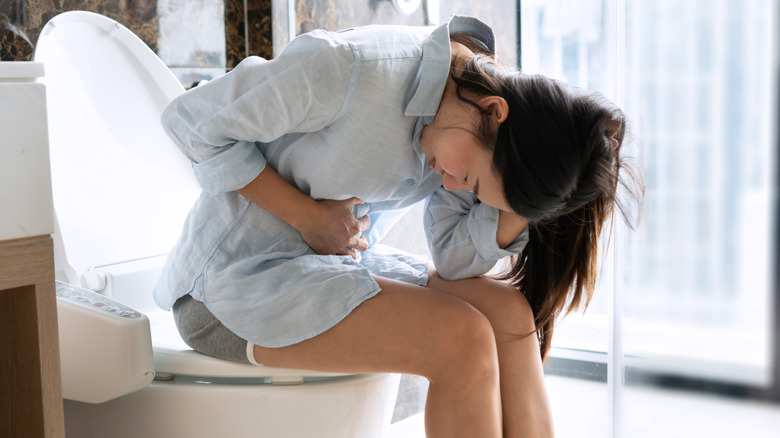The Poop Mistake That Increases Your Risk Of Colon Cancer
Colorectal cancer occurs when malignant polyps form within the inner lining of the colon due to an accumulation of abnormal cell growth. According to Fight Colorectal Cancer, an estimated 1 in 20 people at average risk for colorectal cancer will be affected by the disease during their life. Just as genetics can play a role in one's risk level, so can external factors, such as excess consumption of alcohol, sugar, processed foods, or red meat. Smoking, not getting enough vitamin D, or a lack of fiber in one's diet are also contributing lifestyle factors that may increase one's risk for colorectal cancer. In addition, some research suggests that your bathroom habits may do the same, such as regularly holding in your poop.
Though it may not always strike at the ideal time or place, if you're frequently resisting the urge to go number two, you may be leaving the lining of the colon more susceptible to inflammation, which can increase the risk of colon cancer, explain experts at Carolina Digestive Health Associates.
Constipation may increase colon cancer risk
In addition to inflammation, ignoring nature's call on a regular basis may eventually cause constipation. This is because when we squeeze our rectal muscles to keep stool from being excreted from the body, it has nowhere to go but backwards into the large intestine. As the body reabsorbs the water from our poop, it leaves our stool hard and dry, making defecation more difficult.
2012 research findings presented at the annual meeting of the American College of Gastroenterology (ACG) showed that people with chronic constipation were 1.78 times more prone to developing colorectal cancer compared to individuals without constipation. The researchers emphasized, however, that more research is still needed, particularly as to whether this same risk is evident in patients who are actively treating their constipation. Furthermore, some alternate research has shown no such connection between constipation and colon cancer risk.
To learn more, check out another type of colon disease that has also been linked to constipation.
The research on constipation and colon cancer risk has shown mixed results
In a 2023 study published in Frontiers in Oncology, researchers stated that while there may be a potential connection between constipation and colorectal cancer, causation could not be definitely determined. Similarly, in a 2020 study published in Bioscience Reports that looked at the relationship between abnormal bowel movements and colorectal cancer risk, findings revealed that pooping less than once a day was not found to increase colorectal cancer risk. There was also no increased risk of colon cancer associated with pooping more than once a day, although an increased risk of rectal cancer was identified. So what's considered a normal bowel movement frequency? Healthline reports that anywhere between three times a day and three times a week puts us in the clear.
Even though the research between constipation and colorectal cancer risk is mixed, holding in your bowel movements is never a good idea. In addition to practicing healthy lifestyle habits (and healthy bathroom habits), talk to your doctor if you notice potential signs of colon cancer, such as changes in one's bowel movements, belly pain, bloating, vomiting, blood in your poop, or more. Colon cancer screenings are recommended starting at age 45. In some cases, however, screenings may be suggested at an earlier age for high-risk patients.



